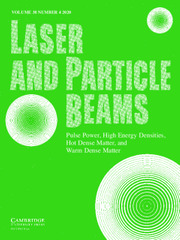Article contents
Cryogenic systems for LMJ cryotarget and HiPER application
Published online by Cambridge University Press: 14 April 2010
Abstract
For the future, we have to develop new sources of energy. These new sources may be based on nuclear fusion with magnetic confinement (as with the ITER experiment) or with a new concept based on inertial confinement. The European community plans to build a facility (HiPER project) which is dedicated to reaching high gain with cryogenic targets, and to test the concepts of target mass production and rep rate shots. The cryogenic system for the 1st phase experiments in HiPER is based on the cryogenic system developed for the French facility Laser MegaJoule (LMJ). The latter must be modified and upgraded for direct drive targets. In particular the target must be protected from the radiation flux from the vacuum vessel by a thermal shroud. In addition, the LMJ system must be equipped with a thermal system to allow layering of the fusion fuel to take place. The new developments concern a leak tightness thermal shroud for direct drive and a fast shroud retractor able to allow the laser shot within few milliseconds.
Information
- Type
- Research Article
- Information
- Copyright
- Copyright © Cambridge University Press 2010
References
REFERENCES
- 4
- Cited by

